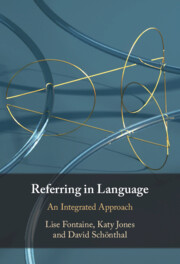Book contents
- Referring in Language
- Referring in Language
- Copyright page
- Contents
- Figures
- Tables
- Acknowledgements
- Part I The Nature of Referring and Referring Expressions
- Part II Typical Reference
- 4 Typicality and Atypicality
- 5 Referring in Spontaneous Discourse
- 6 Referring in Prepared Discourse
- Part III Atypical Reference
- References
- Index
4 - Typicality and Atypicality
from Part II - Typical Reference
Published online by Cambridge University Press: 22 June 2023
- Referring in Language
- Referring in Language
- Copyright page
- Contents
- Figures
- Tables
- Acknowledgements
- Part I The Nature of Referring and Referring Expressions
- Part II Typical Reference
- 4 Typicality and Atypicality
- 5 Referring in Spontaneous Discourse
- 6 Referring in Prepared Discourse
- Part III Atypical Reference
- References
- Index
Summary
This chapter explores and develops the concept of typicality and atypicality both generally and specifically in terms of reference. Existing literature on reference established our core understanding of referring, forming the basis for how we view reference. However, evidence has largely been experimental, computational, philosophical, and/or based on small excerpts. This chapter then sets out the distinction we would like to make on the division between typical and atypical uses. We argue for a view of typicality as conventionalised language use, which can be said to fall within the norms of a given register. Atypicality, conversely includes instances of language which can be said to be infrequent and unconventionalised for a given register. The chapter focusses on existing models of reference which provide an excellent grounding in typical uses of reference through which we can explore the (in)stability of identifiability and view atypical reference as an exploitation of conventionalised norms.
Keywords
- Type
- Chapter
- Information
- Referring in LanguageAn Integrated Approach, pp. 73 - 91Publisher: Cambridge University PressPrint publication year: 2023



